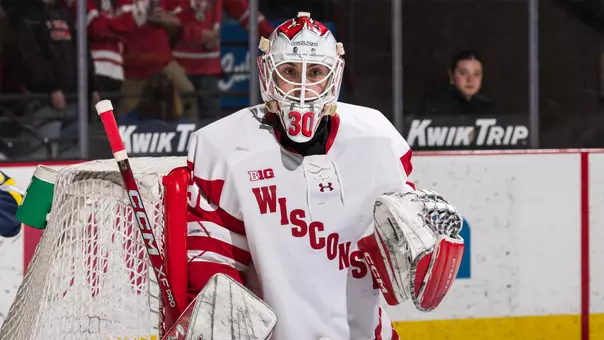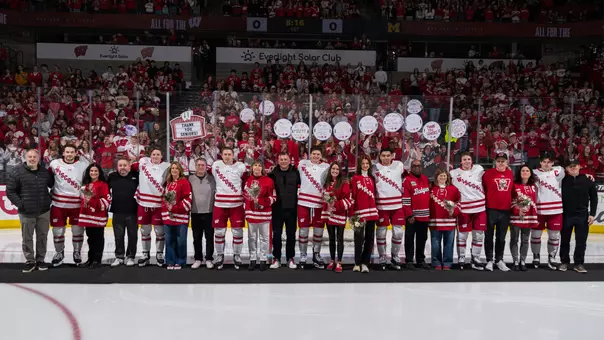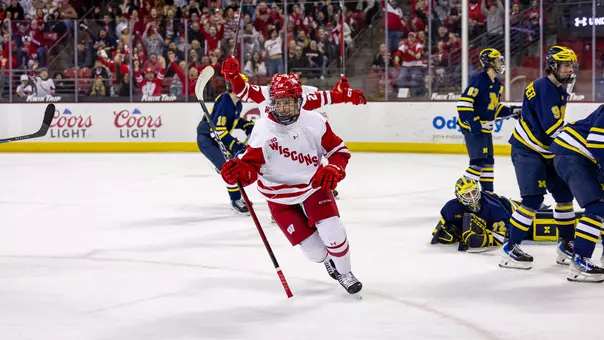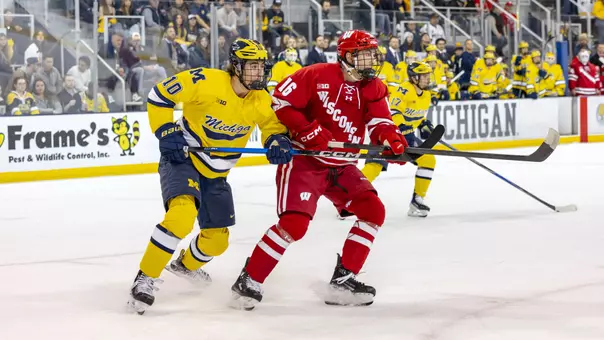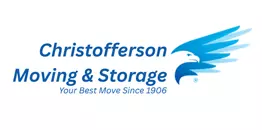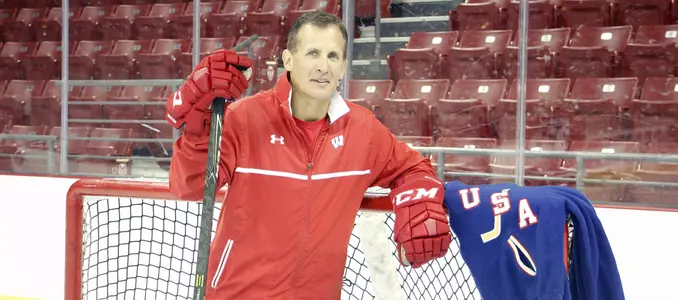
Photo by: Tim Cowie
Granato helps announce U.S. Olympic Team roster on New Year's Day
December 18, 2017 | Men's Hockey
Team USA opens 2018 Olympic Winter Games play on Feb. 14
MADISON, Wis. -- When Tony Granato unveils the roster for the United States men's hockey team that will compete at the 2018 Olympic Winter Games in PyeongChang, South Korea, it will be more than just a list of talented American hockey players. The names called on New Year's Day at the 2018 NHL Winter Classic in New York represent the work Granato, along with his staff, have put into the team over the last five months since being introduced as the team's head coach. Naming the team, however, is just the start of the medal quest.
For the first time in 20 years there isn't a pool of National Hockey League players to choose from, so the Team USA coaches have to draw from college programs, the professional minors and Americans skating in European leagues to field the 25-man team in hopes of securing the country's third medal in men's ice hockey since the turn of the century. Keeping tabs on so many different players spread across several different leagues, all while coaching a Wisconsin team that hasn't dipped out of the national rankings since the start of the calendar year, seems like it would consume more than the afforded 24 hours in a day.
At least, one would think.
"It's not hard to find the time," Granato said. "I'm watching tape pretty much every day, but it might not be a lot. It might be 15 minutes one day, might be an hour the next day. Tape of our players, of our games. I'm making sure that I'm doing everything I can for what I think we can do better at Wisconsin."
And in his free time?
"When I'm at home at night watching NHL games, I'll have my computer on and I'll be doing double work. I'll be watching what's going on in the NHL and I'll be evaluating players or reviewing previous Olympics and world championships, watching our potential opponents."
Granato served as an assistant coach at the 2014 Olympic Games in Sochi where Team USA finished fourth during the same season that he helped lead the NHL's Pittsburgh Penguins to the Eastern Conference semifinals, so balancing high-level roles is something he's accustomed to.
"Well more responsibility, more decisions." He expanded on his new role as compared to being an Olympic assistant coach, "As we put the team together, I obviously have a lot more input on what we're looking for. I'm definitely relying a ton on our scouts and on the coaches that we have around the world that have coached these players and are coaching them currently. We're looking to identify what type of player we're looking for."
Every member of the Team USA staff, which includes former Badgers in assistant coach Chris Chelios and general manager Jim Johannson, has vast experience in international tournaments, which Granato says plays a part in the roster selection process.
"The staff that we have – Chelios, Scott Young, Keith Allain, Ronny Rolston, Jim Johannson and Ben Smith – we've all been a part of staffs, as coaches and as players, in these short tournaments. So when we are selecting players, yes, we're looking back on thing we remember about tournaments.
"We're looking to fit them into a roster based on need, we have to be careful about how we put this together. I think that there's lots of players who are attractive for different reasons and we just have to pick the right reasons to give us the best chance to win."
The team does not convene until heading to PyeongChang, arriving five days before play begins on February 14 with a preliminary-round game against Slovenia. This means Granato doesn't have the luxury of time to get players excited for the opportunity to represent their country.
"We're not going to have nine months together as a group, so you need people who are going to understand and are quality people who want to be a part of something special.
"We need leadership. We need character players. We need guys who will be energized and ready to represent our country in the way that we think we should. The players we're looking for are guys who understand and are doing everything they can to make our team and be ready to help us win in February."
Granato got a chance to see a selection of players at the Deutschland Cup in Augsburg, Germany in November, and while the outcome may give fans pause, Granato isn't worried.
"The evaluation process was the most important part of it. We brought a lot of similar-style players to compare them to each other and see which ones we thought would be better fit for what we're looking for in putting our team together. We didn't try to put together a team to be the best at that tournament. We put together a team of talented players who we thought would be guys who we needed to see and we needed to coach and who needed to get to know us to get ready for South Korea.
"I think how we played and what we did there was something that we should feel good about because I think we did some really good things. I think some players established themselves, and again, building the relationship with them that week was really important."
Team USA went 0-3 at the tournament, suffering a 2-1 loss to Slovakia, a 5-2 loss to Russia and a 5-1 loss to Germany. Granato noted that the loss to Russia was indicative of the role of special teams in international contests. Team USA was leading 2-0 to begin the second period before Russia scored three power-play goals in a 3:43 span to take the lead, scoring late insurance goals to seal the 5-2 win.
"All of those games were games that we easily could have won. They were great games. You look at how they went and we got beat on special teams, especially two of them. But we out-chanced all three teams."
"There were some things there that were good learning tools for us. That's one thing in Olympic competition or international competition, you've got to have a good power play and you've got to have a good penalty kill. Our lineup and our players who we're going to select now, that's going to be a big part of what they bring to the table. Can they play on either one of those?"
Seven members of the Deutschland Cup roster are playing in Russia's Kontinental Hockey League (KHL), which has threatened to restrict its players from participating in the Games. The International Olympic Committee recently announced it would suspend the Russian Olympic Committee after investigations confirmed a state-sponsored doping program, but Russian athletes who pass further drug testing and have not been previously sanctioned will be allowed to compete under a neutral flag as "Olympic Athletes from Russia."
Granato said all Americans playing in the KHL have been approved by the IOC and until further notice, fans can expect to see some of those players named to the Olympic team come Jan. 1.
The Russian hockey team has been favored to medal in 2018 and, as far as Granato is concerned, the ban changes little unless Russia is forced to adjust its pool of players based on sanctions.
"As of right now we're going to assume we're going to play the team we thought we were going to play," Granato said. "Whether they're playing under their flag or not, they're still representing Russia. I'm assuming we'll still be playing the same team."
Granato is expected to miss four Big Ten conference match ups during the Olympics, but says this type of opportunity is what Wisconsin's program is all about. When a member of the Badgers, whether it be coaches, student-athletes or support staff, gets experiences outside of Madison, Granato know it can only advance the program.
"The experience that I'm going to gain over there is going to make me a better coach. That's what coaching is all about, is learning from your experiences. I'm looking forward to working with the staff and coming back a better coach because of it."
For the first time in 20 years there isn't a pool of National Hockey League players to choose from, so the Team USA coaches have to draw from college programs, the professional minors and Americans skating in European leagues to field the 25-man team in hopes of securing the country's third medal in men's ice hockey since the turn of the century. Keeping tabs on so many different players spread across several different leagues, all while coaching a Wisconsin team that hasn't dipped out of the national rankings since the start of the calendar year, seems like it would consume more than the afforded 24 hours in a day.
At least, one would think.
"It's not hard to find the time," Granato said. "I'm watching tape pretty much every day, but it might not be a lot. It might be 15 minutes one day, might be an hour the next day. Tape of our players, of our games. I'm making sure that I'm doing everything I can for what I think we can do better at Wisconsin."
And in his free time?
"When I'm at home at night watching NHL games, I'll have my computer on and I'll be doing double work. I'll be watching what's going on in the NHL and I'll be evaluating players or reviewing previous Olympics and world championships, watching our potential opponents."
Men's Olympic coach @TonyGranato shows up in San Jose to watch US vs. Canada and look who wins players of the game? #Badgers @Bdecker14 and @adesbiens30. Canada won 3-1. pic.twitter.com/Lx8XjtIwbT
— Wisconsin Hockey (@BadgerMHockey) December 16, 2017
Granato served as an assistant coach at the 2014 Olympic Games in Sochi where Team USA finished fourth during the same season that he helped lead the NHL's Pittsburgh Penguins to the Eastern Conference semifinals, so balancing high-level roles is something he's accustomed to.
"Well more responsibility, more decisions." He expanded on his new role as compared to being an Olympic assistant coach, "As we put the team together, I obviously have a lot more input on what we're looking for. I'm definitely relying a ton on our scouts and on the coaches that we have around the world that have coached these players and are coaching them currently. We're looking to identify what type of player we're looking for."
Every member of the Team USA staff, which includes former Badgers in assistant coach Chris Chelios and general manager Jim Johannson, has vast experience in international tournaments, which Granato says plays a part in the roster selection process.
"The staff that we have – Chelios, Scott Young, Keith Allain, Ronny Rolston, Jim Johannson and Ben Smith – we've all been a part of staffs, as coaches and as players, in these short tournaments. So when we are selecting players, yes, we're looking back on thing we remember about tournaments.
"We're looking to fit them into a roster based on need, we have to be careful about how we put this together. I think that there's lots of players who are attractive for different reasons and we just have to pick the right reasons to give us the best chance to win."
The team does not convene until heading to PyeongChang, arriving five days before play begins on February 14 with a preliminary-round game against Slovenia. This means Granato doesn't have the luxury of time to get players excited for the opportunity to represent their country.
"We're not going to have nine months together as a group, so you need people who are going to understand and are quality people who want to be a part of something special.
"We need leadership. We need character players. We need guys who will be energized and ready to represent our country in the way that we think we should. The players we're looking for are guys who understand and are doing everything they can to make our team and be ready to help us win in February."
Granato got a chance to see a selection of players at the Deutschland Cup in Augsburg, Germany in November, and while the outcome may give fans pause, Granato isn't worried.
"The evaluation process was the most important part of it. We brought a lot of similar-style players to compare them to each other and see which ones we thought would be better fit for what we're looking for in putting our team together. We didn't try to put together a team to be the best at that tournament. We put together a team of talented players who we thought would be guys who we needed to see and we needed to coach and who needed to get to know us to get ready for South Korea.
"I think how we played and what we did there was something that we should feel good about because I think we did some really good things. I think some players established themselves, and again, building the relationship with them that week was really important."
Team USA went 0-3 at the tournament, suffering a 2-1 loss to Slovakia, a 5-2 loss to Russia and a 5-1 loss to Germany. Granato noted that the loss to Russia was indicative of the role of special teams in international contests. Team USA was leading 2-0 to begin the second period before Russia scored three power-play goals in a 3:43 span to take the lead, scoring late insurance goals to seal the 5-2 win.
"All of those games were games that we easily could have won. They were great games. You look at how they went and we got beat on special teams, especially two of them. But we out-chanced all three teams."
"There were some things there that were good learning tools for us. That's one thing in Olympic competition or international competition, you've got to have a good power play and you've got to have a good penalty kill. Our lineup and our players who we're going to select now, that's going to be a big part of what they bring to the table. Can they play on either one of those?"
Seven members of the Deutschland Cup roster are playing in Russia's Kontinental Hockey League (KHL), which has threatened to restrict its players from participating in the Games. The International Olympic Committee recently announced it would suspend the Russian Olympic Committee after investigations confirmed a state-sponsored doping program, but Russian athletes who pass further drug testing and have not been previously sanctioned will be allowed to compete under a neutral flag as "Olympic Athletes from Russia."
Granato said all Americans playing in the KHL have been approved by the IOC and until further notice, fans can expect to see some of those players named to the Olympic team come Jan. 1.
The Russian hockey team has been favored to medal in 2018 and, as far as Granato is concerned, the ban changes little unless Russia is forced to adjust its pool of players based on sanctions.
"As of right now we're going to assume we're going to play the team we thought we were going to play," Granato said. "Whether they're playing under their flag or not, they're still representing Russia. I'm assuming we'll still be playing the same team."
Granato is expected to miss four Big Ten conference match ups during the Olympics, but says this type of opportunity is what Wisconsin's program is all about. When a member of the Badgers, whether it be coaches, student-athletes or support staff, gets experiences outside of Madison, Granato know it can only advance the program.
"The experience that I'm going to gain over there is going to make me a better coach. That's what coaching is all about, is learning from your experiences. I'm looking forward to working with the staff and coming back a better coach because of it."
Highlights || #2 Michigan
Friday, February 20
Mike Hastings Weekly Media Conference || Wisconsin Men's Hockey || Feb. 17, 2026
Tuesday, February 17
Highlights || Ohio State || Feb. 13
Friday, February 13
Kohl Center Olympic Torch Relay
Wednesday, February 11

